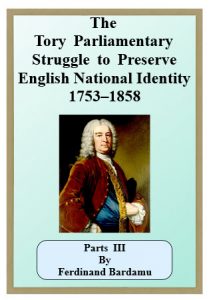The Jewish Campaign Against Parliamentary Anti-Judaism, 1829–1836
The movement for Jewish “emancipation” in nineteenth-century England was spearheaded by Jews and their Whig or Liberal allies, while the opposition was led by the High Tories:
The High Tory majority in the House of Lords had acted as a barrier to the advancement of Jewish ‘emancipation’ —-and some of the arguments
put forward against the Jews, both in and out of Parliament, reflected the traditional Tory view that Church and State were part of an inseparable entity, in the promotion of which Jews ought to play no part. (Alderman, 2015)
In practice, Anglo-Jewry had more freedoms than their compatriots in central Europe, but in late-Georgian England, the laws on the books indicated that they were less free. Cecil Roth writes:
The entire body of medieval legislation which reduced the Jew to the position of a yellow-badged pariah, without rights and without security other than by the goodwill of the sovereign, remained on the statute book, though remembered only by antiquarians. As late as 1818 it was possible to maintain in the courts Lord Coke’s doctrine that the Jews were in law perpetual enemies, ‘for between them, as with the devils, whose subjects they are, and the Christian there can be no peace.’
Despite his freedoms vis-à-vis Ashkenazim of Central Europe, in the English society of the nineteenth century, politically and professionally, the Jew was still excluded from the mainstream:
Public life was, in law, entirely barred. Jews were excluded from any office under the Crown, any part in civic government, or any employment however modest in connexion with the administration of justice or even education, by the Test and Corporation Acts. —These made it obligatory on all persons seeking such appointment to take the Sacrament in accordance with the rites of the Church of England. —Naturally these disqualifications included the right to membership of Parliament, for which the statutory oaths in the statutory form were a necessary preliminary. For the same reason the universities were closed, and, as a consequence of this, various professions.
